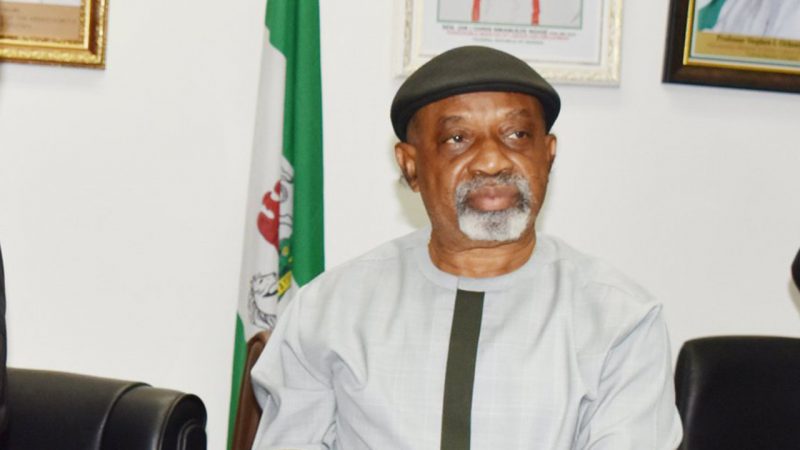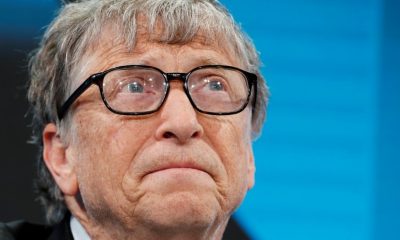Health
FG can’t use bond to keep us in Nigeria, doctors reply Ngige

Doctors in Nigeria have rejected a proposal by the Minister of Labour and Employment, Dr Chris Ngige, for physicians trained in Nigeria to work in the country for at least nine years before being allowed to migrate.
This is just as Sunday PUNCH observed that the number of Nigerian doctors practising in the United Kingdom had hit 8, 983 as of Saturday and is likely to hit 9,000 this week.
Ngige had during the 2022 budget defence of his ministry at the House of Representatives earlier in the week lamented the effect of brain drain on the health sector in relation to the low cost of medical education in the country.
According to the minister, medical workers trained by the government should be made to sign a bond that would make them serve the country for at least nine years before they can consider relocating to another country.
He had said, “Medical education in Nigeria is almost free. Where else in the world is it free? The Presidential Committee on Health should come with a proposal for bonding doctors, nurses, medical laboratory scientists and other health workers so that they don’t just carry their bags and walk out of their country at will when they are trained at no cost.
READ ALSO:
- Nigeria needs to tackle agitations before leading to crises – PCC
- Masked thugs storm Ogun community, rape housewives, kidnap two
- Police arrest notorious armed robber, recover stolen car, ammunition
- Biafra: S/East traditional rulers, Igbo bishops commend IPOB, make demands on Kanu’s trial
“In London, it is £45,000 a session for medical education in universities. If you go to Edinburgh or Oxford, you pay $80,000. If you go to the USA you pay $45,000 but if you go to the Ivy leagues, you pay $90,000 for only tuition, excluding lodging. You do it for six years. So, people in America take loans.
“We can make provisions for loans and you pay back. If the government will train you for free, we should bond you. You serve the country for nine years before you go anywhere.”
But the Medical and Dental Consultants Association of Nigeria and the Guild of Medical Directors on Saturday faulted Ngige’s plan.
The immediate past president of MDCAN and a member of the National Executive Council of the Association, Prof. Ken Ekilo, in an interview with Sunday PUNCH faulted Ngige’s proposal about the bond.
According to Ekilo, lots of factors contribute to the brain drain being reported in the country and creating bonds won’t solve them.
He stated, “The minister’s suggestion shows a poor appreciation of the forces at play concerning brain drain in Nigeria. The Nigerian work environment is hostile to the medical doctors and the Nigerian security situation is hostile to Nigerian citizens. Infrastructure is poor, equipment is obsolete, drugs and supplies are out of stock, and the personnel are few, overworked and underpaid.
“There is no sense of job satisfaction, professional growth or commensurate financial reward. These are the push factors, the salaries being offered by the destination countries are irresistible, in addition to perks such as paid holidays, free education for children, sponsorship for training, conferences, and workshops all within the context of a stable society with functional social amenities. These are the pull factors.
“The idea of bonding doctors alone is faulty on several fronts. First, it is not only doctors that are trained at public expense, so the bond will have to be required of anyone who has passed through the public education system in Nigeria.”
He argued that the policy would send the wrong signal to workers, as it will indicate a failure of ideas on the part of government and a resort to coercion reminiscent of countries lacking in social liberty.
READ ALSO:
- NDLEA Arrests 12 Apapa Dock Workers over Link to Seized N9.5bn Cocaine
- It’s nobody’s business what I do with my boobs –BBNaija star, Angel
- 18 Days after Launch, CBN’s eNaira Registers 488,000 Subscribers in 160 Countries
- Olu Jacobs steps out first time after rumoured death
The doctor argued the policy would encourage emigration through the backdoor and other illegal means would boom as would human trafficking.
“Lastly, the government cannot implement this without infringing on both the doctors’ fundamental human rights and the freedom guaranteed to citizens under the Nigerian constitution. I sympathise with the government, it is not an easy problem to solve and difficult decisions must be made,” Ekilo added.
Also, the National President of the Guild of Medical Directors, Prof. Olufemi Babalola, in a separate interview with Sunday PUNCH said the minister should not propose the idea of a bond seeing as he had said during an interview a while ago that there was no brain drain.
Babalola added, “This is not the way to curb brain drain in the country. I seem to recall that it was this same minister who said there was no brain drain some time ago. The fact that he is proposing this solution would suggest an acknowledgment on the part of the government that we do have a serious crisis on our hands.”
According to him, the average medical graduate seeks greener pastures abroad, not because they do not prefer to stay at home but because conditions are atrocious and salaries are scandalously low for the skill set they possess.
“A medical doctor in government employment in Nigeria today cannot afford to buy a new car. Not even a foreign-used car. That is the extent to which doctors have been debased in Nigeria. Let us address the issues and make the situation much more attractive and they will stay to serve their motherland. You can’t force them,” Babalola said.
The President, Association of Resident Doctors, Lagos State University Teaching Hospital, Ikeja chapter, Dr Azeez Ojekunle, said Ngige’s statement would increase the rate of brain drain in the country.
“We were looking forward to having a panacea for the long-standing massive brain drain, but quite unfortunate that response from such a stakeholder will only inevitably worsen the exodus in a rather geometric pattern.
READ ALSO:
- Bandits Kill Nine People, Rustle Livestock in Zamfara
- ‘I salute their courage’, Buhari mourns soldiers killed by ISWAP
- W/Cup qualifiers: Super Eagles beat Liberia 2-0
- Nigerian Army needs no warning against overthrowing Buhari government – Defence headquarters
“Such proportion will cause exodus in the early medical career path which currently is more among practising medical doctors and will then progress to medical students who glaringly see the deplorable state of practising environment in the health care sector.
“Even right now, final year medical students are begging to write examination to exit the country as soon as upon completion of their housemanship,” Ojekunle said.
But the Joint Health Sector Union, which comprises all medical professionals who are not doctors, argued that the proposed policy ought not to apply to its members because only doctors received subsidised education.
The spokesperson for JOHESU, Olumide Akintayo, in an interview with Sunday PUNCH said only medical doctors enjoyed the subsidised medical education mentioned by the minister and should have no problem with the proposed bond.
He said, “It is only doctors who enjoy that privilege of subsidised medical education. It is not okay for the minister to include other health workers.”
Recently, there has been a surge in the number of medical doctors leaving the country.
Meanwhile, Sunday PUNCH observed that the number of Nigerian doctors in the UK had risen to 8,983 and is expected to surpass 9,000 this week going by the daily rate of four Nigerian doctors being licensed in the UK per day.
Checks by our correspondent showed that at least 264 doctors had been licensed by the UK General Medical Council in the last 53 days, an average of 4.6 Nigerian doctors per day.
A check on the website of the council showed that as regards the number of foreign doctors working in the UK, Nigeria comes third, only behind India and Pakistan which have 30,388 and 15, 962 doctors respectively operating in the UK.
The statistics also showed that between November 13, 2020, and November 12, 2021, the number of Nigerian-trained doctors in the UK had risen by 932.
Punch
Health
Drug prices may drop as FG implements zero VAT, duties

Drug prices may drop as FG implements zero VAT, duties
Experts say prices of drugs are likely to drop following the implementation of the federal government’s executive order on zero VAT and excise duties on pharmaceutical products and medical devices.
The Nigeria Customs Service yesterday said it had commenced the implementation of Value Added Tax (VAT) and import duty exemption on raw materials essential for the production of pharmaceutical products.
The National Public Relations Officer of the Nigerian Customs Service (NCS), Assistant Comptroller of Customs, Abdullahi Maiwada, in a statement on Wednesday, said the decision was in line with the presidential order to boost local production of healthcare products
President Bola Tinubu had, in June last year, signed the Executive Order to increase local production of pharmaceutical, diagnostics and medical devices.
The NCS’ spokesman said: “Critical raw materials essential for the production of pharmaceutical products will be exempted from import duty and Value Added Tax (VAT) for a period of two years.”
The statement added that the exemption covers Active Pharmaceutical Ingredients (APIs), excipients and other vital raw materials required for manufacturing essential medicines, Long-Lasting Insecticidal Nets (LLINs), Rapid Diagnostic Kits, reagents and packaging materials.
READ ALSO:
- Ex-Kano emir Bayero cancels Sallah durbar amid tension
- Poland suspends migrants’ right to apply for asylum
- Trump slaps 25% tariffs on car imports to US
- Reps pass bill to strip Vice President, governors, deputies of immunity
Maiwada said to ensure that these fiscal incentives are fully utilised, eligibility is limited to manufacturers of pharmaceutical products recognised by the Federal Ministry of Health and Social Welfare, provided they possess a valid Tax Identification Number (TIN).
Experts speak
Experts said the implementation of the Executive Order would address the skyrocketing cost of medicines.
A former National Secretary of the Pharmaceutical Society of Nigeria (PSN), Pharm. Iyiola Gbolagade, in a chat with our correspondent, described the implementation of the Executive Order as commendable, saying it would lead to reduction of prices some locally manufactured medicines like antibiotics and antimalarial drugs.
A former chairman of the Association of Community Pharmacists of Nigeria (ACPN) FCT chapter, Pharmacist Eneojo Made, said the implementation of Zero VAT and exercise duties on Active Pharmaceutical Ingredients (APIs), which are used to produce medicines, would boost the production of essential medicines for various categories of diseases thereby enhancing availability and access to them in the country.
A former National Publicity Secretary of the Association of Community Pharmacists of Nigeria (ACPN), Kenneth Edeh Ujah, said, “When the cost of production of medicines at various stages is lower, of course, it is going to have that direct impact on the eventual cost of the medicine when people visit the pharmacy to buy their drugs.”
Also, Prof Cyril Odianose Usifoh, the immediate past president, Pharmaceutical Society of Nigeria (PSN), said the potential for success in the order was boosted because specified items include Active Pharmaceutical Ingredients (APIs), excipients, essential raw materials required for manufacturing of crucial products, including drugs, long lasting insecticidal bed nets, rapid diagnostic kits and others.
The Federal Ministry of Health and Social Welfare had, in a statement, said the Executive Order is a significant milestone, as it opens the door for local pharmaceutical and medical device manufacturers to begin fully benefiting from the relief measures outlined by President Bola Ahmed Tinubu in the Executive Order
Drug prices may drop as FG implements zero VAT, duties
Health
Nigerian doctor pioneers W’Africa first robotic prostate cancer surgery

Nigerian doctor pioneers W’Africa first robotic prostate cancer surgery
A Nigerian Consultant Urological/Robotic Surgeon, Professor Kingsley Ekwueme on Monday in Lagos pioneered the first West African robotic surgery on a prostrate cancer patient.
Ekwueme, a UK-based medical doctor returnee recently established The Prostate Clinic, (TPC) Nigeria Centre for Robotic and Laparoscopic Surgery, the first super-specialised clinic in West Africa dedicated to the diagnosis and treatment of prostate cancer, utilising cutting-edge robotic surgery.
“This is truly historic,” declared Ekwueme, the clinic’s founder.
“We are bringing technology that has never been seen before in this region, giving Nigerians access to world-class treatment right here at home.”
The clinic’s centerpiece is the Da Vinci Robot, an advanced surgical system that provides unparalleled precision and minimally invasive procedures. “
Briefing journalists on the feat, Ekwueme explained that: “The Da Vinci Robot offers three-dimensional imaging and seven degrees of freedom, allowing for surgeries with minimal blood loss and faster recovery times.”
“Patients experience significantly less pain and scarring compared to traditional open surgeries.”
Ekwueme, a renowned urologist, emphasised that the technology extends beyond prostate cancer.
“We are treating a range of urological conditions in both men and women, including kidney cancer, bladder cancer, kidney stones, and benign prostatic hyperplasia. Our goal is to transform surgery in Nigeria.”
READ ALSO:
- How 12 inmates escape in Kogi jailbreak – Prison spokesman
- Fubara: Supreme Court reacts to photo of Justice Agim with Wike
- Aviation workers threaten nationwide airports shutdown over Customs officer assault
Noting that the key focus of the clinic was accessibility, he said he is determined to make these advanced procedures affordable for all Nigerians.
“My mission is to ensure that no one in this country dies needlessly due to a lack of access to quality care.
“We are working to make these procedures as cost-effective as possible, and we are open to partnerships with the government to expand our reach.”
To address Nigeria’s power challenges, the clinic is equipped with a comprehensive solar power system, ensuring uninterrupted operations. “We understand the importance of reliable power.
“Our 24-hour solar system ensures that we can provide consistent, high-quality care.”
He said he is also committed to training local medical professionals in robotic surgery, ensuring the long-term sustainability of the technology in Nigeria.
“We are investing in the future of Nigerian healthcare. We want to empower our doctors with the skills they need to provide world-class care.”
Debunking common misconceptions about prostate and sexual activities, Ekwueme clarified that there is no proven dietary prevention for prostate cancer. “The primary risk factors are age, race, and family history. Early detection and access to advanced treatment are crucial.”
Looking ahead, Ekwueme revealed plans to introduce groundbreaking technology for benign prostatic hyperplasia (BPH) with zero blood loss.
“I am doing a procedure tomorrow, and soon I will unveil a technology that has never been done in Africa, splitting the prostate from the inside with absolutely no blood loss,” he stated.
He said with its state-of-the-art technology, commitment to affordability, and focus on local training, The Prostate Clinic Nigeria Centre for Robotic and Laparoscopic Surgery is poised to revolutionise cancer care in West Africa, offering hope and advanced treatment options to countless Nigerians.
Nigerian doctor pioneers W’Africa first robotic prostate cancer surgery
Health
FG destroys another 200 containers of expired drugs

FG destroys another 200 containers of expired drugs
The Federal Government Joint Committee on the destruction of fake, illicit and expired pharmaceuticals has destroyed another 200 containers of substandard drugs worth billions of Naira imported into the country through the Apapa and Tin-Can Island seaports.
This is coming after the committee initially destroyed 250 containers of the same expired pharmaceutical products in January, 2025.
To this end, the committee comprising the Nigerian Customs Service (NCS), National Security Adviser (NSA), National Drug Law Enforcement Agency (NDLEA), National Agency for Food Drugs Administration and Control (NAFDAC) and Nigerian Army has destroyed a total of 450 containers of expired drugs in the first quarter of 2025.
The destruction exercise which took place in Epe, Lagos State yesterday, was part of a broader initiative of the Federal Government to curb importation of illicit and controlled drugs in order to safeguard public health and curb drug-related crimes in the country.
The pharmaceuticals destroyed were Tramadol, codeine, Apetamine, and Analgin injection amongst others.
Speaking to newsmen, the National Security Adviser (NSA), Mallam Nuhu Ribadu, said the initiative was important to prevent the circulation of dangerous substances such as Tramadol and Codeine, which are often abused, thus contributing to criminal activities in the country.
READ ALSO:
- Rivers court bars woman from answering ex-husband’s name
- PDP gives condition to back Atiku, Obi, El-Rufai in 2027
- Gov Fubara’s suspension dents Nigeria’s image, says ex-President Jonathan
Mallam Ribadu, who was represented by Ibrahim Sulaiman, said the destroyed drugs were seized at Apapa, Tin Can, and Lekki seaports.
He, however, disclosed that similar destruction was conducted in Port Harcourt as part of the first phase.
“The National Security Adviser is very passionate about ensuring that these illicit drugs do not remain in circulation. The government will not allow perpetrators to act with impunity; they will be arrested and prosecuted,” he stated.
The intercepted drugs were either expired or classified as controlled substances that should only be used under strict medical supervision.
Also, the Assistant Customs Controller, A.O Oguntuase from FOU Zone A, emphasised the enforcement efforts of security agencies in tracking and intercepting these illegal imports.
“Through intelligence gathering and swift action, we have been able to prevent the distribution of these drugs.
“The value of the destroyed substances is enormous, with each container estimated to be worth close to a billion naira,” he said.
On his part, representative of the NDLEA, DC Omotosho Solomon, stated that suspects arrested in connection with the goods were being tried in court.
Solomon warned importers engaged in the trafficking of illicit drugs and pharmaceuticals to desist from such acts or face the full process of law on illegal importation.
FG destroys another 200 containers of expired drugs
-

 metro2 days ago
metro2 days agoMan jailed 3 months for non-declaration of $30,000 at airport
-

 International2 days ago
International2 days agoTrump slams Nigeria with high tariff in shocking trade crackdown
-

 metro2 days ago
metro2 days agoUpdated: Notorious bandit leader Bello Turji goes berserk, kills 12 for Eid
-

 metro1 day ago
metro1 day agoPetitioners mobilise constituents for fresh Natasha’s recall
-

 metro6 hours ago
metro6 hours agoScavenger killed, many injured as military grenade explodes in Lagos
-

 metro3 days ago
metro3 days agoEdo Gov Okpebholo wins round one as tribunal upholds his election
-

 metro1 day ago
metro1 day agoFraud rocks FIRS, court orders final forfeiture of Abuja, Kano houses linked to official
-

 metro2 days ago
metro2 days agoSouth African court acquits Nigerian pastor of rape after 8 years in jail











